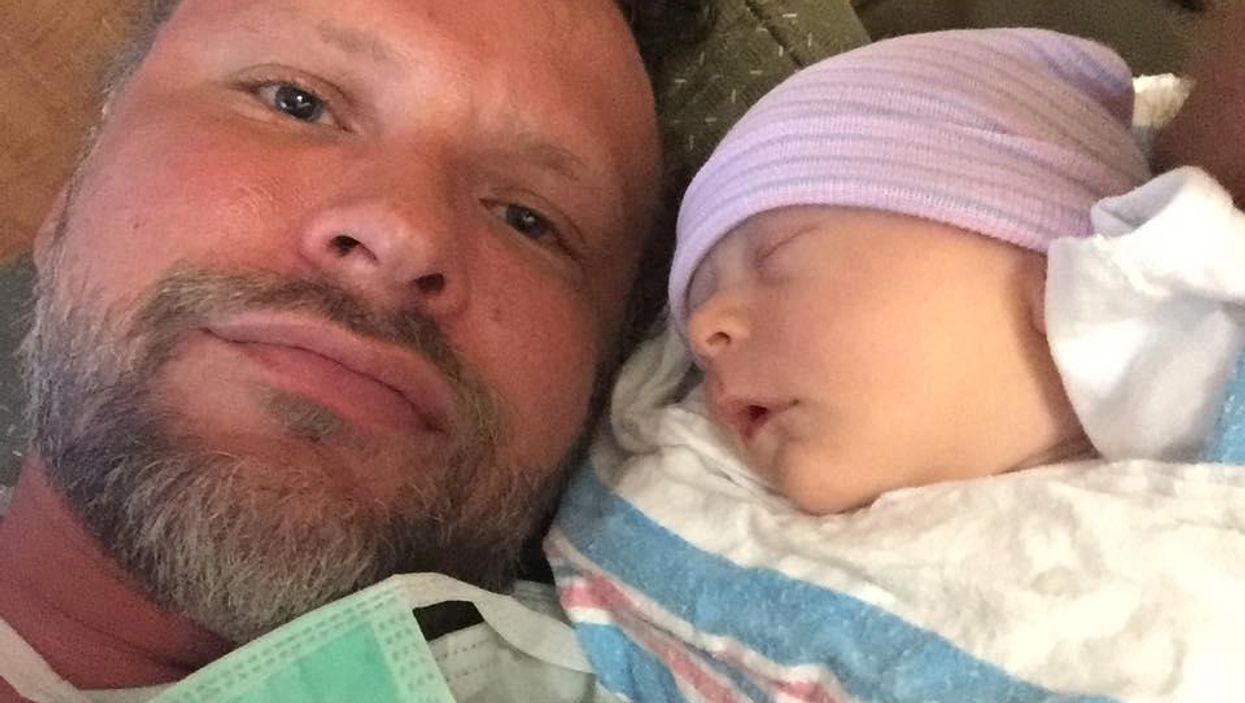Science & Tech
Kristine Guerra
Oct 26, 2016

The abdominal pains, which felt like waves of menstrual cramps, got worse throughout the day. Finally, Stephanie Jaegers decided she had to go to the hospital.
She was having some back pain, too, and it hurt when she urinated, so Jaeger thought she might have kidney stones.
When she and her husband got to the hospital, staff asked her if she was pregnant. No, she said. At 37, the mother of two boys and a girl was done having babies. Baby clothes were donated, and the car seat and crib were stowed away in the attic.
How could she be pregnant in the first place? She hadn't experienced morning sickness or breast tenderness. Her stomach was bulging a bit, but it wasn't big. Her weight had fluctuated by only a few pounds over the last months, she told The Washington Post.
Plus, she was on her period that day.
But the doctors at Piedmont Henry Hospital in Stockbridge, Ga., about 40 miles outside of Atlanta, decided to do an ultrasound anyway. They also tested her blood and urine.
She was, in fact, about 38 weeks and two days pregnant, doctors told her. Not only that -- she was also already in labor. Her water had broken, and she was dilated.
Disbelief immediately set in. How did she not feel her water break? And how did she not know she was having contractions? She had given birth three times, so she knew what a contraction felt like. The cramps she was having didn't feel anything like that, she said.
And then, panic.
"I was doing the math in my head, and I'm like, 'Wait a minute, that's like now,' " Jeagers's husband Michael said.
The couple said they immediately tried to go through the past months. Had she eaten anything she was not supposed to eat? She fell and broke her ankle recently; could that have hurt their baby? More important, is their child going to be healthy? The last time Stephanie Jaegers gave birth -- to her 2-year-old daughter Sadie -- she had a lot of complications and had to have a surgery and blood transfusion after. Doctors had recommended not having more children.
"At first you're scared. You go through all the fears," Stephanie Jaegers said. "We're not prepared. We were not going to have any more kids. We have been taking precautions to not have any more."
The Jaegers said their baby was breech, and the feet were up near the head. The baby was also sitting behind a rib. They were told that could explain why Stephanie Jaegers never felt the baby move and why she just looked bloated, not nine months pregnant, the couple said. She also had learned earlier that she was already premenopausal, which could explain the hormonal imbalance.
The couple first thought their baby would be delivered via C-section, but after examining her further, doctors saw that she was fully dilated, and a portion of the baby's butt was starting to show, Stephanie Jaegers said. She ended up giving birth naturally.
Shaun Jude Jaegers was born at 3:50 a.m. Wednesday, almost six hours after his mother arrived at the hospital the night before -- and about three hours after his parents found out he even existed.
He was 7 pounds and 19 inches long.
Of the couple's four children, they said, he came out the healthiest. The mother and son were home by Friday.
Michael Jaegers said their situation isn't as rare as they had initially thought. Over the past week, he said, they heard from people who said they had similar experiences.
"Believe it or not, it is sometimes possible for a woman to carry a baby all the way to term without ever realizing she is pregnant," Bryan Jick, a California OB/GYN, wrote.
Jick said the condition is called cryptic pregnancy, where hormonal imbalance prevents a woman from realizing she's pregnant. Unknowingly carrying a child to term often happens to overweight or obese women, he wrote. Spotting or light bleeding also sometimes occur during pregnancy, and women with irregular menstrual cycles can mistake this for their period.
According to a German study of births at all of Berlin metropolitan hospitals in 1995 and 1996, one in 475 women did not know she was pregnant at 20 weeks, and one in 2,455 gave birth without realizing she was pregnant until labor.
The belief that cryptic pregnancies, also called denied pregnancies, "are exotic and rare events is not valid," according to the study. "Deliveries in which the woman has not been aware of her pregnancy until going in labor occur about three times more often than triplets."
Recent examples include a Massachusetts woman who gave birth to a 10-pound baby girl early last year, just an hour after she found out she was pregnant.
Late last year, a 47-year-old woman who went to the hospital with severe abdominal pain gave birth an hour later.
In 2012, a British woman gave birth to a premature baby boy while serving in Afghanistan. According to BBC, the woman found out she was pregnant after having abdominal pains.
The Jaegers, of Locust Grove, Ga., said they still have a lot of adjusting to do. Shaun only has a basket of clothes.
"Most people have nine months to physically and financially prepare for something like this," Michael Jaegers said.
The feeling of disbelief hasn't completely gone away yet.
"It was scary for a second," Stephanie Jaegers said. "But we're lucky and thankful that it turned out the way it did."
Top 100
The Conversation (0)













